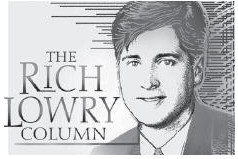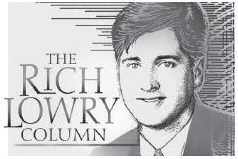Trump’s Miserable Month


So far, Donald Trump is having the worst campaign launch since Beto O’Rourke.
Like almost everything else he’s done lately, his early announcement of his next presidential campaign has proved a flagrant political misjudgment.
A move that was supposed to demonstrate his strength is showing his weakness; a move that was meant to keep other candidates out of the race is an invitation to other candidates to get in; a move that was supposed to serve notice of his continued dominance of the party is pointing toward its potential end.
He’s been eclipsed as an internet troll by Elon Musk, and as a vote-getter by Gov. Ron DeSantis.
He’s managed to get the worst of both worlds — he’s been largely invisible at the same time that he’s been involved in several damaging controversies.
His midterms got even worse, with the final thudding defeat of one of his prized political projects, Herschel Walker in the Georgia Senate runoff.
And Trump’s entry hasn’t boosted his poll numbers, or even stabilized them. He’s continuing to slide versus DeSantis, with a couple of new polls showing him trailing the Florida governor in a hypothetical head-to-head matchup.
In short, it’s hard to imagine how Trump could have had a worse monthlong run. Ordinarily one might say, as a way of exaggerating to emphasize the point, that it only could have been worse if he had had dinner with a Nazi — but, of course, he did that, too.
It’s still early, and premature to count Trump out. Elected Republicans remain scared of him, and we still can’t know if the only potential candidate to show strength against him, De-Santis, will run, or how he’d perform.
If Trump is going to win the nomination, though, it will involve recovering from his disastrous announcement and aftermath.
He clearly believed that the act of announcing in and of itself would be sufficient to cement his status as top dog. That was wrong, and it meant he never thought through the rather crucial question, “So you’re a candidate — now what are you going to do?”
There’s been no media blitz. There’s been no tour of the country. There’s been no rollout of policy or any unifying theme.
If it’s too early to make too much of the polls, the former president is still in a uniquely vulnerable place. It’s one thing to be trailing if you are a new figure on the national stage who still has room to grow; it’s another if you have universal name ID and everyone already has an extremely well-formed view of you.
It’s going to be hard for Trump to find a second act when his act hasn’t changed since 2015. Besides, even if he purports to have turned a new leaf, who at this point is going to believe him?
He doesn’t have easy levers to use to change the narrative. It’s not as though he can have a good legislative session next year like the governors who are thinking of running or use his executive powers to pick useful fights.
There probably aren’t even exciting new events he can hold to grab the attention of voters or the media. His signature, of course, are his rallies. They were fresh and new in 2015 and 2016, and quite powerful throughout his presidency and immediately afterward. Now, they are as old and familiar as a Rolling Stones concert.
What’s been most damaging to Trump is that association with him in general and “Stop the Steal” in particular proved politically toxic in the midterms. Other Republicans can try to achieve distance in the future. But obviously Trump can’t.
These things would have been true even if he hadn’t announced already, but if he hadn’t gotten in, people would have wondered if he’d instantly look stronger once he was actually in the race. Now, he’s answered that question for his adversaries decidedly in the negative.
Rich Lowry is editor of the National Review.
Synd., Inc.






out of
Posted on